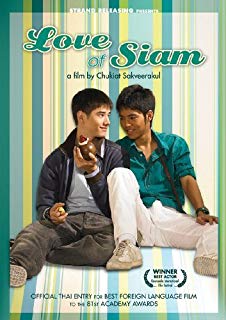電影訊息
愛在暹邏--The Love of Siam
編劇: 楚吉克沙維拉根
演員: 維特維斯特‧海倫亞沃恩酷 馬力歐莫瑞爾 庫曼‧文雅莎 辛賈潘妮特 宋西特‧隆努帕空西
爱在暹罗/暹罗之恋/爱在暹罗广场
![]() 0 / 0人
Thailand:150分鐘 | Thailand:154分鐘 | Thailand:178分鐘 (Director's cut) | USA:157分鐘 (US dvd version: 157
0 / 0人
Thailand:150分鐘 | Thailand:154分鐘 | Thailand:178分鐘 (Director's cut) | USA:157分鐘 (US dvd version: 157
編劇: 楚吉克沙維拉根
演員: 維特維斯特‧海倫亞沃恩酷 馬力歐莫瑞爾 庫曼‧文雅莎 辛賈潘妮特 宋西特‧隆努帕空西
電影評論更多影評

2008-04-08 23:11:33
'It's the Love of Thailand - Rak Haeng Siam" - A Thought-provoking Review from
It's the Love of Thailand - Rak Haeng Siam
M.L. NATTAKORN DEVAKULA
Forget politics and the economy. It's Rak Haeng Siam that should encapsulate our hearts.
All I can say is, what a movie! If you haven't already been to the theatres to see this latest Thai flick, don't read this article for it may contain plot spoilers.
Last Thursday I had the opportunity to see the film - and man, it was an emotional as well as educational ride.
I'm sure many conservative young adults who caught the movie are probably raising questions about the appropriate or inappropriate nature of showing a homosexual kissing act on screen in a movie that is targeted at teenagers.
Though this point is valid from a particular point of view, it is rather the fault of the lack of a workable rating system for movies in Thailand, rather than that of the director or producer.
On this point I, however, feel differently. The film allows viewers, young and old, to ask themselves important questions about society, relationships, family, love and sex, leading us to understand ourselves in a more self-reflective character-study fashion.
For those who mainly criticise the film for its homosexual-related content as having been featured to create a stir and hence enhancing the commercial value of the movie, there is a point that needs to be mentioned. Rak Haeng Siam could just as easily have unfolded itself as a story of love-bound strong friendship between the two male leads and still work effectively as a philosophical romance. The point that the film attempts to teach viewers - and a largely conservative Thai society - is that love is an evolved form of emotional attachment that transcends sexual attraction of the physical form.
Tong, a high-school student, is the lead male character and is played by Mario Maurer - in his first major motion picture performance that is likely to make him a major attraction for all audiences in the years to come. He falls for Mew who was his best friend from childhood. The emotional attachment, specific and unique, was tailored simply to this one individual. There were also certain moments in the film, as well, where Tong could have, if given more screen-time character re-development, fallen for Ying - the lead female character.
The creative direction of the plot, if analysed, is simply trying to convince us that love is a non-sexual phenomenon and is rather a feeling that extends beyond the regular pre-conceived notions of male-to-female sexual attraction.
The film lets us pose such interesting questions as to whether homosexuality or bisexuality is simply a confused state of mind, an adaptive social characteristic, or an emotional variance emanating from personal selection. It pits very open-ended answers that include everything from the mentioned explanations to forcing us to answer for ourselves what really defines the non-detachable love of our lives. The asexual love, if there ever is one, from the human's first inner instinct dating back to preliminarily conscious days.
There is also the hidden satire on the role that strict enforcement of religious values plays in kids' upbringing and how these virtues in turn may sometimes lead to disruptions in the role-play of non-conforming family members. Is it ever just to betray values set by one's parents in order to search for oneself? Or, would the wise and more adult-like responsible action be to conform to what is "morally" acceptable?
Tong certainly makes his choice at the end in this movie. Is it the right choice? You may say that it indeed is. Although I bet some of the more liberal members of the audience would probably beg to differ.
Last but not least, the movie also exposes the reality that there are plenty of conceited, hollow, good-looking individuals in society who get by without any real ability to adopt spiritually meaningful relations with other members of their community. The classically pretty "Donut" character exemplifies this. The fair-skinned, tall girl with big, attractive eyes and long, flowing hair in the end offers nothing but superficial physical attributes, and a soul-less personality.
Rarely does a Thai film gradually reveal itself over a two-hour period into a magnificent and consequential story. Rak Haeng Siam does just that. It is a movie worth watching for those who need to understand the real meaning of love. It is especially for those who accept the typical bounds of society for what they are.
Watching this movie makes this year seem like less of a nightmare. If it is the case that a lot of kids have seen this movie, it is even more relevant that parents give it a try, for it may just be the key to understanding our sensitive and ever-changing younger generation.
In a country where kids grow up while simultaneously conforming to the expected role-play, sometimes we need a little reminder that the rules of games must bend flexibly to the individuals within the society. Why must a handsome man be in love with a slender, socially-deemed cute gal? Can't he be mentally attached - non-sexually - to another much more intriguing being? Would the formation of a virtuous utopian culture be dealt a blow if that individual turns around to be physically attracted to another - yet of the opposite sex - in a loveless fashion? Rak Haeng Siam is about love. It is about life.
http://pages.citebite.com/g1v4t5j6utct 舉報
評論

